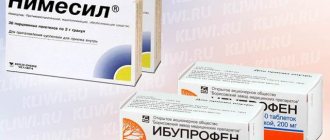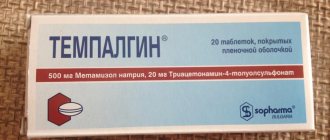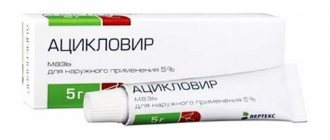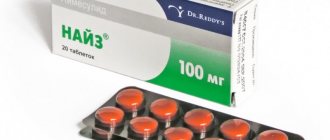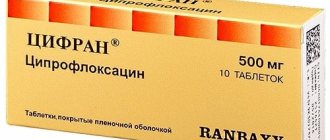Ibuprofen
The simultaneous use of ibuprofen with the following drugs should be avoided:
- Acetylsalicylic acid: with the exception of low doses of acetylsalicylic acid (no more than 75 mg per day) prescribed by a doctor, since combined use may increase the risk of side effects. With simultaneous use, ibuprofen reduces the anti-inflammatory and antiplatelet effect of acetylsalicylic acid (an increase in the incidence of acute coronary insufficiency in patients receiving small doses of acetylsalicylic acid as an antiplatelet agent is possible after starting ibuprofen).
- Other NSAIDs, in particular selective COX-2 inhibitors: simultaneous use of two or more drugs from the NSAID group should be avoided due to a possible increased risk of side effects.
Use with caution simultaneously with the following medications:
- Anticoagulants and thrombolytic drugs: NSAIDs may enhance the effect of anticoagulants, in particular warfarin and thrombolytic drugs.
- Antihypertensive drugs (ACE inhibitors and angiotensin II antagonists) and diuretics: NSAIDs may reduce the effectiveness of drugs in these groups. In some patients with impaired renal function (eg, dehydrated patients or elderly patients with impaired renal function), coadministration of ACE inhibitors or angiotensin II antagonists and cyclooxygenase inhibitors may lead to a deterioration of renal function, including the development of acute renal failure. (usually reversible). These interactions should be considered in patients taking coxibs concomitantly with ACE inhibitors or angiotensin II antagonists. In this regard, the combined use of the above drugs should be prescribed with caution, especially in the elderly. Patients should be prevented from dehydration and consideration should be given to monitoring renal function upon initiation of this combination treatment and periodically thereafter.
Diuretics and ACE inhibitors may increase the nephrotoxicity of NSAIDs.
- Glucocorticosteroids: increased risk of gastrointestinal ulcers and gastrointestinal bleeding.
- Antiplatelet agents and selective serotonin reuptake inhibitors: increased risk of gastrointestinal bleeding.
- Cardiac glycosides: simultaneous administration of NSAIDs and cardiac glycosides can lead to worsening heart failure, a decrease in glomerular filtration rate and an increase in the concentration of cardiac glycosides in the blood plasma.
— Lithium preparations: there is evidence of the likelihood of an increase in the concentration of lithium in the blood plasma during the use of NSAIDs.
- Methotrexate: there is evidence of the likelihood of an increase in the concentration of methotrexate in the blood plasma during the use of NSAIDs.
- Cyclosporine: increased risk of nephrotoxicity with simultaneous administration of NSAIDs and cyclosporine.
- Mifepristone: NSAIDs should be started no earlier than 8-12 days after taking mifepristone, as NSAIDs may reduce the effectiveness of mifepristone.
- Tacrolimus: when NSAIDs and tacrolimus are co-administered, the risk of nephrotoxicity may increase.
— Zidovudine: simultaneous use of NSAIDs and zidovudine may lead to increased hematotoxicity. There is evidence of an increased risk of hemarthrosis and hematomas in HIV-positive patients with hemophilia who received concomitant treatment with zidovudine and ibuprofen.
- Quinolone antibiotics: in patients receiving concomitant treatment with NSAIDs and quinolone antibiotics, the risk of seizures may increase.
— Myelotoxic drugs: increased hematotoxicity.
— Cefamandole, cefoperazone, cefotetan, valproic acid, plicamycin: increased incidence of hypoprothrombinemia.
- Drugs that block tubular secretion: decreased excretion and increased plasma concentrations of ibuprofen.
— Inducers of microsomal oxidation (phenytoin, ethanol, barbiturates, rifampicin, phenylbutazone, tricyclic antidepressants): increased production of hydroxylated active metabolites, increased risk of developing severe intoxications.
Microsomal oxidation inhibitors: reducing the risk of hepatotoxicity.
— Oral hypoglycemic drugs and insulin, sulfonylurea derivatives: increased effect of drugs.
- Antacids and cholestyramine: decreased absorption.
— Uricosuric drugs: decreased effectiveness of drugs.
— Caffeine: increased analgesic effect.
Indications for use
Ibuprofen belongs to the group of non-steroidal anti-inflammatory drugs (NSAIDs) - derivatives of phenylpropionic acid. In the instructions for tablets and capsules for adults, we see primarily prescriptions related to the symptomatic treatment of diseases of the joints or spine (rheumatoid arthritis, osteoarthritis, bursitis, sciatica), the fight against pain from injuries, myalgia and neuritis. In children's forms, we find the following indications: sore throat, pain with otitis media, teething, reduction of fever during ARVI or influenza, relief of symptoms of fever during childhood infections and post-vaccination reactions.
Of course, the indications are not limited to those mentioned above. We list here the most common types of pathologies where Ibuprofen does an excellent job eliminating inflammation and pain:
- Pathologies of the musculoskeletal system, pain relief: ankylosing spondylitis, radiculitis, spinal osteochondrosis, exacerbation of gout, polyarthrosis, psoriatic arthritis, tendinitis, inflammation of soft tissues in injuries, back pain, joint pain, trauma, sprains, dislocations, myalgia of various types .
- Diseases of the peripheral nervous system: neuralgia and neuritis.
- Gynecology: primary dysmenorrhea, secondary dysmenorrhea, pain during painful menstruation, with adnexitis.
- Relief of various types of pain: toothache, headache, migraine, sore throat, ear pain with otitis media, muscle pain.
- Use as an antipyretic for fever, flu, ARVI and colds. Increased temperature in infectious and inflammatory diseases.
- Relief after vaccination, including against coronavirus.
Ibuprofen ointment 5%
The drug is widely used as an external agent. Ointments and gels are produced in pure form or with the addition of cooling agents.
The ointment helps with arthritis, sprains, pain from damaged ligaments, back pain, sports injuries, and neuralgia.
How to use Ibuprofen ointment?
Usually the ointment is prescribed to adults and children over 14 years of age.
The dosage depends on the manufacturing company. A gel from 4 to 10 cm approximately contains 50 – 125 mg of the drug and this is a single dose. The product should be gently rubbed into the skin. Reapply no earlier than after 4 hours. The maximum daily dose is 500 mg.
Ibuprofen ointment
Instructions for taking Ibuprofen for adults and children.
- A single dosage for an adult is 200 mg; in case of severe pain, you can take 400 mg, the dosage frequency is 3-4 times a day, but not more than 1200 mg per day.
- A single dose for a child over 6 years old is 200 mg, can be taken 3-4 times a day. The maximum dosage for children per day differs by age as follows: for children 12-17 years old - 1000 mg; for children aged 6 to 12 years - 800 mg.
Ibuprofen Welfarm for adults
How many days can you take Ibuprofen?
The drug is taken for 2-3 days; if the patient’s condition does not improve or becomes worse, it is necessary to stop taking it and consult a doctor.
Ibuprofen for children
Ibuprofen in the form of syrup for children is used from the age of 3 months and can begin to act within 15 minutes. The tablets take effect within 30 minutes.
How to use baby syrups?
Children's syrups are usually made using fruit fillings and therefore children take them with pleasure. For the little ones there is a measuring syringe complete with syrup, where 1 ml contains a certain dose of Ibuprofen.
It is necessary to follow the manufacturer's instructions, the maximum daily dosage for a child is 30 mg per 1 kg of body weight, the interval between doses is from 6 to 8 hours. As we noted earlier, the duration of treatment should not exceed 3 days. Syrups are popular and therefore they are often designed for use up to 12 years, although tablets can also be used from 6 years.
The dose of syrup for a child can be determined from the table.
| Child's age | Body weight in kg | Dosage | Maximum dose per day |
| 3-6 months | 5kg-7.6kg | 50 mg up to 3 times a day | 150 mg |
| 6-12 months | 7.7-9 kg | 50 mg up to 3-4 times a day | 200 mg |
| 1-3 years | 10-16 kg | 100 mg up to 3 times a day | 300 mg |
| 4-6 years | 17-20 kg | 150 mg up to 3 times a day | 450 mg |
special instructions
- Ibuprofen is prescribed in a short course - three days. If therapy lasts 10 days or more, you should consult a doctor.
- Elderly patients need to carefully monitor the tolerability of the drug, as they are more likely to experience side effects.
- May temporarily reduce female reproductive function (the effect disappears after discontinuation).
- It may affect the ability to drive vehicles, so if the patient notices lethargy or drowsiness, he should refrain from driving vehicles and other activities where reaction speed is required.
Ibuprofen for children
Myths that we encounter in daily practice
Myth 1. Using NSAID drugs in the form of suppositories is less aggressive for the stomach than taking pills
This is 100% a myth. The pathogenic, destructive effect of the drug is realized through the blood, delivering it through the vessels to the stomach.
Myth 2. Medicines from the group of antacids - Rennie, Maalox, Phosphalugel and H2-blockers (Ranitidine and Famotidine) can be used as “gastroprotectors”
In this case they are not effective.
Myth 3. You can't take proton pump inhibitors regularly
The fact is that if an elderly person has been prescribed an anti-inflammatory drug for life, it is absolutely pointless to prescribe gastroprotection for a month. In such cases, medications should be taken strictly in parallel.
Myth 4. Food products (jelly, etc.) can act as “gastroprotectors”
We will leave this myth as absolutely fantastic without comment.
Side effect
- Like all medications, Ibuprofen can cause allergic reactions: skin itching, urticaria, Quincke's edema, anaphylactic reactions, incl. anaphylactic shock. In this case, you should stop taking the drug and consult a doctor.
- The following side effects may be observed on the part of the digestive system: pancreatitis, nausea, vomiting, erosive and ulcerative lesions of the gastrointestinal tract, stomach and abdominal pain, stomatitis, liver dysfunction, hepatitis.
- Genitourinary system: polyuria, renal dysfunction, renal failure, edema, cystitis, nephrotic syndrome, interstitial nephritis.
- Nervous system and sensory organs: irritation and dry eyes, ringing in the ears, hallucinations, psychomotor agitation, confusion, headaches, anxiety, irritability.
- Respiratory system: allergic rhinitis, bronchospasm, shortness of breath.
- Cardiovascular system: agranulocytosis, leukopenia, increased pulse, hypertension, heart failure.
What forms does Ibuprofen come in?
In pharmacies you can find four dosage forms of the drug:
- If there are no contraindications related to the gastrointestinal tract, then people usually choose tablets or capsules.
- In cases where there is a stomach disease in the acute stage or the patient for some reason cannot swallow a tablet, suppositories are prescribed.
- Syrups are prescribed to infants. Most pediatricians prefer to reduce fever using Ibuprofen rather than Paracetamol, since the former acts faster and longer, and also has a lower safety profile due to the absence of toxic metabolites.
- For pain in the joints, muscles, back, and injuries, the ointment is ideal.
Contraindications:
- Hypersensitivity to the components of the drug.
- Bleeding disorders, hemophilia.
- Hematopoietic disorders.
- Erosive and ulcerative lesions of the gastrointestinal tract in the acute stage, bleeding in the gastrointestinal tract.
- Kidney or liver failure.
- Severe heart failure.
- The period after coronary artery bypass surgery.
- “Aspirin triad” (aspirin intolerance, nasal polyps and bronchial asthma).
- Diseases of the optic nerve.
- Caution should be exercised when taking other NSAIDs.
- Simultaneous use of medication and alcoholic beverages is not recommended.


